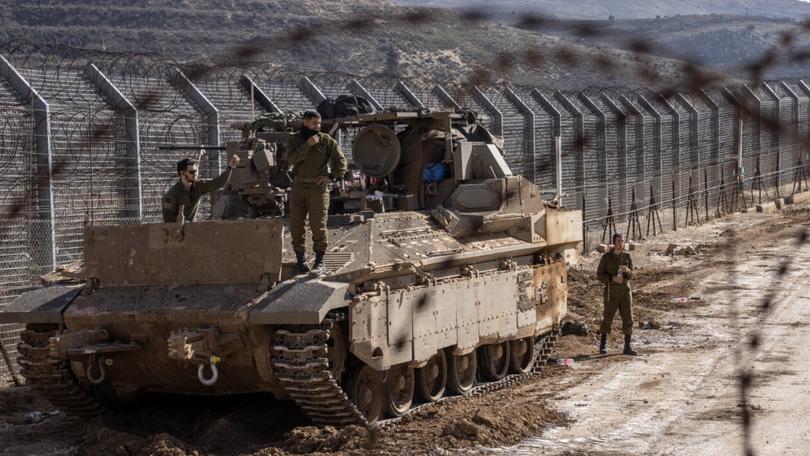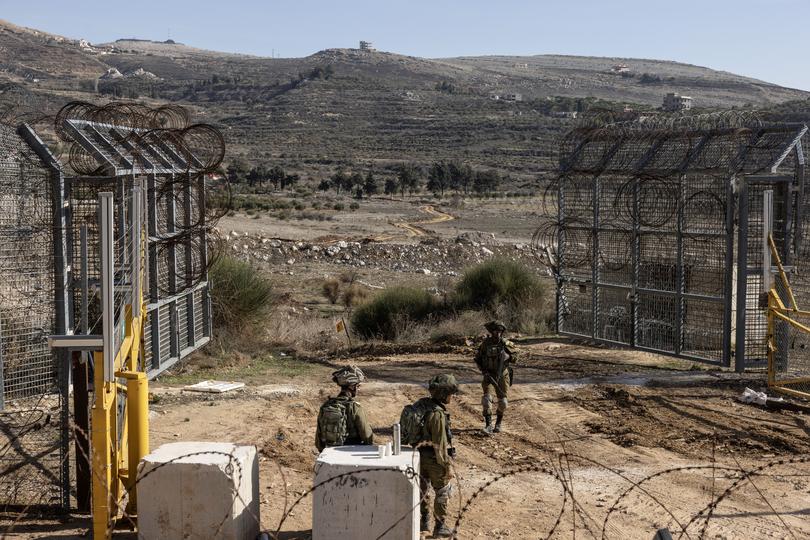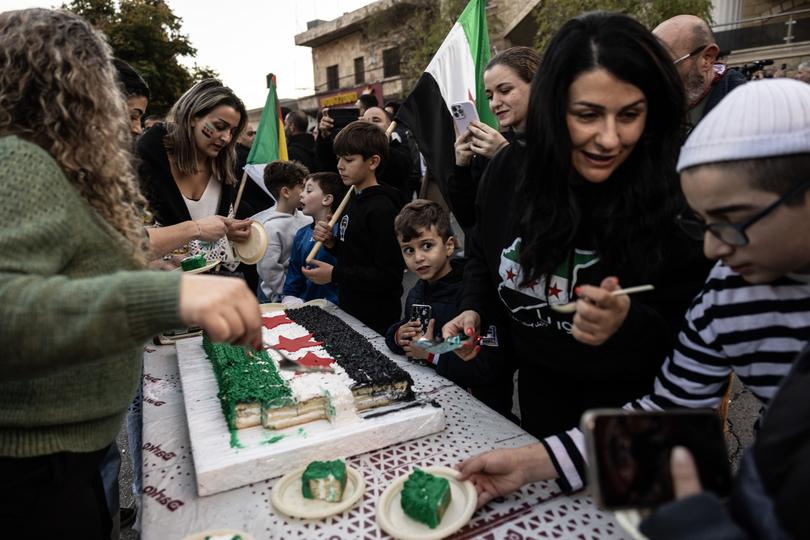THE WASHINGTON POST: Israeli troops move swiftly into Syrian territory after rebel takeover
Israel defended its actions as defensive in nature, securing the country from future attacks, while Arab countries said they amounted to an illegal occupation.

Within hours of rebels taking control of Syria’s capital, Israel moved to seize military posts in that country’s south, sending its troops across the border for the first time since the official end of the Yom Kippur War in 1974.
Arab countries criticised the incursion as an illegal occupation and warned that it could further destabilise Syria as a patchwork of rebel groups try to reimpose civic order after the overthrow of Bashar al-Assad. Hayat Tahrir al-Sham (HTS), the Islamist rebel group that led the shock offensive, has yet to publicly comment on the situation.
Israeli officials defended the move as limited in scope, aimed at preventing rebels or other local militias from using abandoned Syrian military equipment to target Israel or the Golan Heights, an area occupied by Israel after the 1967 Arab-Israeli war. On Monday, more troops could be seen outside this Druze village adjacent to the border, preparing to cross.
Sign up to The Nightly's newsletters.
Get the first look at the digital newspaper, curated daily stories and breaking headlines delivered to your inbox.
By continuing you agree to our Terms and Privacy Policy.“This is a temporary defensive position until a suitable arrangement is found,” Prime Minister Benjamin Netanyahu said in English in a video statement Sunday, local time. In the Hebrew version of his statement, Netanyahu did not use the word “temporary.”
“I think this a terrible mistake by Israel,” said Eyal Zisser, a professor at Tel Aviv University, “because no one is interested in Israel right now. To push ourselves in the middle right now … what interests does it serve?”
The Israeli government was still scrambling to understand the implications of Assad’s stunning fall from power, according to a former Israeli security official who was familiar with deliberations in the coalition. Like others in this article, he spoke on the condition of anonymity to discuss sensitive issues.
In an address Monday, Netanyahu took credit for the collapse of the Assad regime, saying it was “a direct result of the blows” Israeli forces had inflicted on Iran, Hamas and Hezbollah. “As I promised, we are reshaping the Middle East,” he said.
As Assad and his family fled to Russia overnight Saturday, units from the Israel Defence Forces took control of a Syrian monitoring base atop Mount Hermon, which straddles the Lebanon-Syria border north of the Golan Heights. Syrian troops had already fled the facility, according to Israel media reports, and no fighting occurred. The Israeli air force, meanwhile, was carrying out strikes on what it said were weapons stores and other military targets across Syria, which Israeli Foreign Minister Gideon Saar said was to prevent them from falling into the hands of rebel groups.

On Monday, Israeli Defence Minister Israel Katz said IDF troops were authorised to go farther and seize positions beyond the narrow UN-monitored demilitarised zone separating the Israeli-occupied Golan Heights and Syria.
In a media briefing Monday, local time, in New York, UN spokesman Stéphane Dujarric said personnel with the UN Disengagement Observer Force (UNDOF) “remain in position carrying out their mandated activity.” He said the Israeli military informed UNDOF before it moved into “at least three locations” in the separation area. UNDOF told its Israeli counterparts that “there should be no military forces or activities in the area of separation,” Dujarric said.
Israel intended to exercise “complete control over the buffer zone” and “establish a security zone free of heavy strategic weapons and terrorist infrastructure in the southern area - beyond the buffer zone - to eliminate potential threats to the State of Israel,” Katz’s office said in a statement.
The Israeli government informed the Biden administration before moving into Syrian territory, according to a US official, describing the actions as temporary.
The troops were looking for weapons stashes, including chemical weapons, and any material that could be used in an attack on Israel, said the former Israeli official. The IDF said that it had deployed additional tank, artillery and infantry units to the border but that no additional reserves had been called up.
The heightened military activity was visible Monday along the rolling frontier outside Majdal Shams. Fighter jets flew overhead. Two armoured personnel carriers and a pair of combat bulldozers were idling on the Israeli side of an open yellow border gate. Troops prepared their equipment.
Alon Koren Blid, an Israeli soldier, checked the oil on one of the personnel carriers. The 21-year-old, who has fought inside Lebanon and Gaza in the past year, had been on home leave when he was ordered to the Syrian border Sunday.
“We expect to be here about a week,” he said, with the rocky valley of Syria just beyond him. “It could be more, could be less - we don’t really know.” The units across the border had already gone about a half a mile inside, he said.
In a briefing for reporters Monday, Israeli Foreign Minister Gideon Saar said Israeli troops could range up to a “mile or two” within Syria, but stressed that operations would be “limited and temporary.”
Those reassurances have done little to placate regional governments. Egypt’s Foreign Ministry condemned what it said was a “blatant violation” of Syrian sovereignty; the Arab League accused Israel of acting “illegally.”
Israel and Syria have battled frequently over the disputed border and its commanding elevations - positions coveted by armies for their strategic advantages. Syrian forces peered for miles into Israel from their watch station atop Mount Hermon, and Israel is said to be able to observe the Syrian capital, Damascus, from its own facility on an adjacent peak.
Israel captured the Golan Heights in 1967 after being attacked by Syria and neighbouring states. After the 1973 Yom Kippur War, the sides reached a separation agreement that established a buffer zone overseen by UN monitors. In 2019, bucking the widely held international view that Israel’s occupation of the area is illegal, President Donald Trump reversed US policy and recognised it as Israeli territory.
The Israeli side of the frontier is dotted with growing towns and long-established Druze villages, whose occupants have deep ties to communities in both countries. While some are Israeli citizens, many view themselves as Syrians first.
Druze residents of Majdal Shams held a celebration Monday evening. Children joyfully waved the Syrian opposition flag, and residents chanted in support of Syrian unity as cake was passed around. When a truck with Israeli soldiers rolled through, the children ran alongside it with their flags.
Sulman Mdah, 46, a jewellery store owner, came with his wife and two grown children. All had rejected Israeli citizenship. “This was our dream,” he said of Assad’s fall.
“We hope to go visit our country, our new country,” said 60-year-old Sanaa Abu Salah.
Chuck Freilich, former deputy national security adviser for Israel and a frequent Netanyahu critic, said Israel had a clear defensive imperative to secure Syrian military assets along the border.
If the regime’s chemical weapons, missile stocks and aircraft fell into the wrong hands, they could pose a threat not just to Israel but to Jordan and other neighbouring countries, he said. And governments were wise to be sceptical of the long-term intentions of HTS, formerly affiliated with al-Qaida. The group has distanced itself from its jihadist roots and claims to represent all Syrians, but is still listed as a terrorist organisation by the United States and other governments.
“There are not many examples of a terrorist group gaining control over an entire state,” Freilich said.
But Carmit Valensi, a senior researcher at Israel’s Institute for National Security Studies, said Israel could be jeopardising its chances of good relations with a historically hostile neighbour in favour of a short-term security boost.

“It will be important for us to generate positive ties with positive communities in Syria near our border,” she said. If the temporary positions became permanent, she added, “this would turn us from a potential partner to an enemy.”
Another person familiar with Israeli cabinet discussions said the country was determined to move rapidly as officials assessed the rebels’ intentions and tried to gauge the evolving role of its nemesis Iran, which has seen its proxy network weakened and its land routes through Syria compromised by the fall of Assad.
“They are figuring it out as it moves because there is no playbook,” the person said.
Israelis gathered Monday at a spot overlooking the Syrian side of the Quneitra border crossing, where Israeli forces had entered the day before. The quiet valley had echoed with explosions and gunfire over the past week, said an Israeli reservist who lives and serves in the Golan Heights.
Einat Gross Berger, 47, came to the area from a nearby town with her two kids to eat hummus and pita and “celebrate” what she described as win for Israeli security. She hoped the IDF would keep control of the territory it had seized.
“We are religious people,” she said, pointing to the headscarf wrapped around her head in the Jewish tradition. “And this area is ours.”
Hendrix reported from Jerusalem. Missy Ryan in Washington and Claire Parker in Cairo contributed to this report.
© 2024 , The Washington Post
